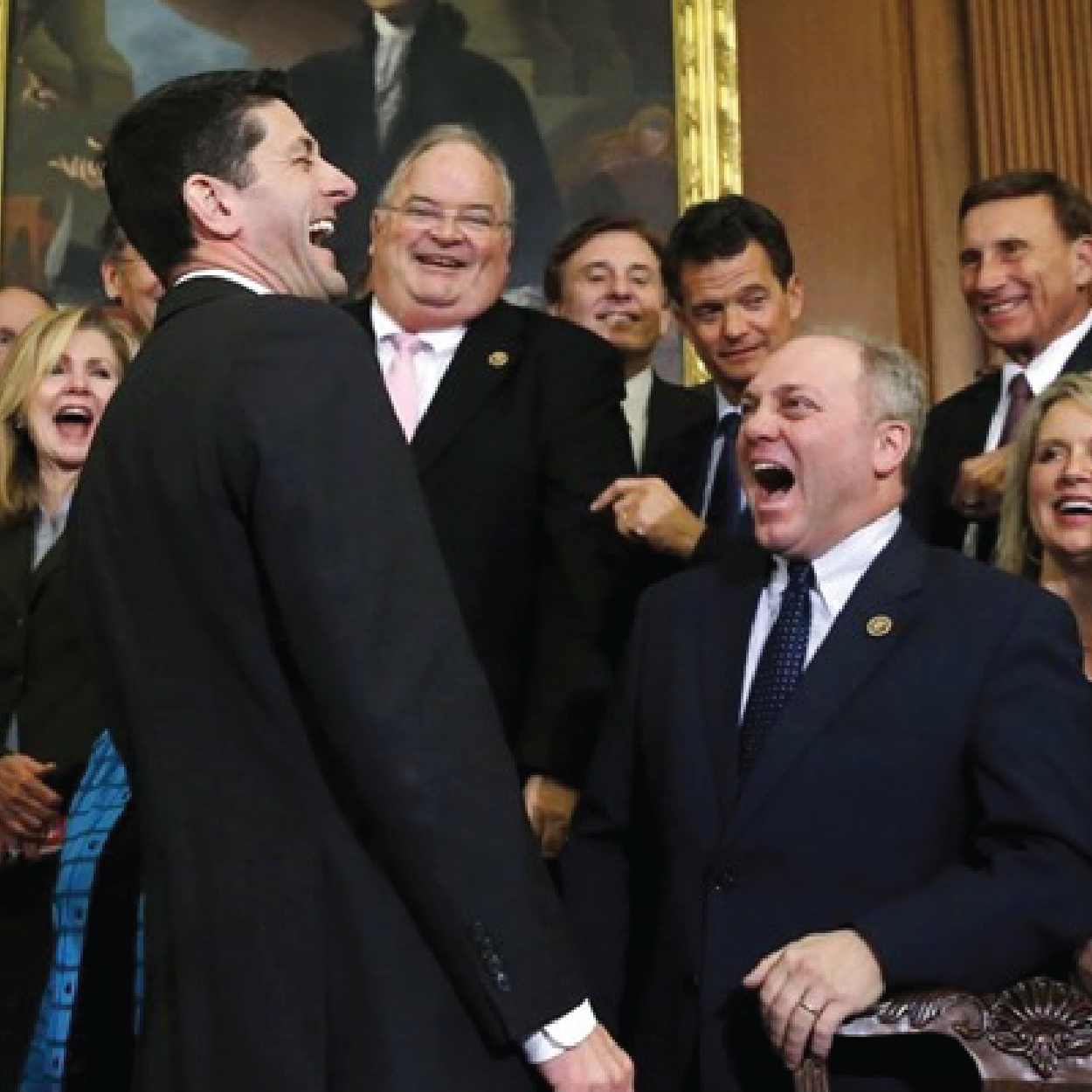Definition of Socialism:
Any program or policy where the Federal, State, or Local government financially supports, funds, or owns a service or an organization that delivers goods or services to individuals or to the local community, state, or nation.
Invididuals, Small Business

Programs or policies that are primarily for the benefit of individuals and small businesses.
Democratic Socialism
Accepted, Current

Programs or policies that have become generally or universally accepted as positive and necessary that have become institutions across our nation and society.
Bipartisan Socialism
Large Corporations, Wealthy

Programs or policies that are primarily for the benefit of large corporations and wealthy individuals.
Republican Socialism
Socialism (as defined) has been around forever!
The Social Contract
The first time that two people joined together and agreed that the woman would do the hunting and the man do the cooking or vice versa (or better yet, both share all tasks), socialism was born.
As soon as that family joined a tribe and agreed to divide or share the duties of hunting, cooking, protection, childcare, etc., socialism had arrived.
When the first king levied taxes of crops or other valuables, promising protection for the people, socialism became an institution – the Social Contract was born.
Call a Spade a Spade
You can’t claim that giving money to the wealthy and to large corporations is “Job Creation” and at the same time say that giving money or support to middle and lower income people or small businesses is “Socialism”
Republican Socialism and Democratic Socialism
In both types, the government gives money to one group or the other. For some reason, Republican Socialism (tax breaks, industry subsidies, etc.), has not been called “Socialism”, while programs that support people, families, small business, and individual freedom have been labeled “Socialism”.
Republican Socialism and Democratic Socialism are the same process. They just benefit different groups of people.
The Social Contract
The Social Contract is a basic and implied agreement that we all make to avoid the chaos and anarchy of every person for themselves. We agree to cooperate for common social benefits (safety, fairness, etc.) by agreeing to sacrifice some small amount of individual freedom for government protection. Our Constitution has many provisions to prevent this sacrifice from going too far, essentially keeping the balance of the Social Contract.
Republican Socialism and Weakness
Many people will make the argument that Social Programs, particularly safety net programs like unemployment benefits, SNAP (food stamps), Medicare, etc., make people weak.
The same argument should apply to Republican Socialism programs. Not having to pay for research and development, police protection, fire protection, local roads, and local schools makes businesses weaker. They can make a profit without being efficient because other businesses and people bear the costs of them running their company.
Democratic Socialism Makes Business Strong
The most basic principle of Capitalism states that the economy will make the best use of its finite resources if everyone pays the real value for that resource. Fairness principles of Democratic Socialism make this happen.
Bipartisan Socialism Quietly Keeps Industry Running
Excellent roads, public water and sewer systems, dams, transportation, and many more, reduce the cost to run a business in an area and for the foundation for commerce.
Republican Socialism Limits Freedom and Kills the American Dream
We call it the “Starvation Floor.” People who do not have wealthy parents can’t take as many risks, spend as much money on their education, or start businesses. They are forced to stay with low paying jobs that underutilize their ability. They have no freedom of mobility.
Democratic Socialism Increases Personal Freedom and Promotes Families and the American Dream!
Imagine that a young family could start their family when they want, invest in higher education or vocational training, or start a revolutionary new business without having to worry about health care costs, childcare costs, or training costs. Investors only need to fund the idea, not the cost of living. New innovation would explode! The economy would grow. People would prosper. The Land of Opportunity would reign again!
Bipartisan Socialism Makes Us Healthy and Drives Innovation
National Science Foundation and University investment in research has driven numerous advancements in health care and science that have changed our lives for the better and been the launching pad for many of our leading businesses and entire industries.
Democratic Socialism Will Make US Companies More Competitive Globally
Over the past decade, iconic American Companies have been purchased by their more efficient European and Asian competitors (Chrysler, Anheuser-Busch (Budweiser), 7-Eleven, Ben & Jerry’s, General Electric, Holiday Inn). Through removing the burden of health care costs and providing better trained employees, we can become more competitive.
Bipartisan Socialism Enhances Our Enjoyment of Life
Parks, community education, youth sports programs, local arts, music, theatre, and hundreds of other happiness and life-enhancing programs that we use every day are examples of Bipartisan Socialism.
Socialism is not a Socialist Economy or Communism
In a Social Democracy, people still elect their leaders. People and private businesses (large and small), still own most of the economy, products, resources, services, property and distribution of goods and services.
With a socialist economy or communism, the government owns all property and the entire economy. No one wants or advocates that.
Public Goods
Public Goods are a basic concept taught during introductory economics and social studies classes. Most of these can be called Bipartisan Socialist Programs
Some goods and services are needed for the benefit of all and for the maintenance of the Social Contract.
Allowing them to be provided privately or permitting them to be consumed electively will result in the underfunding of a service or protection essential for the survival of society (military, police, roads, education, government, etc.)
Bipartisan Socialism Built the US Economy
For decades, the US had the best public schools and public universities. This was the foundation for the rapid growth of our economy and the incredible wave of innovation that propelled it.
Republican Socialism Hurts Existing Companies and Small Businesses
When a new company moves into a community with promises of public funding and property tax holidays for decades, it hurts existing businesses, particularly small businesses, entrepreneurs, and individuals. The costs for that new company (roads, police, fire, schools, utilities, etc.) are shifted to the people and businesses that have supported the community for years, while the new Republican Socialism grants give the new company a free pass.
Democratic Socialism Promotes Growth, Innovation, and Small Business
With ideas like Medicare for All, publicly funded post-secondary education (trades, community college, and universities), childcare, medical leave, Democratic Socialism removes the barriers to innovation and start-up businesses that currently exist. Worried about supporting their families requires people to underinvest in their own training and prevents thousands of great ideas and new businesses from having the chance to form.
Bipartisan Socialism Makes Our Community Safe
Police, Fire, and Emergency Support services are proven and popular examples of Bipartisan Socialism.
Republican Socialism Stifles Innovation and Entrepreneurialism
Forcing every new business to pay for owner and employee health care, employee training, etc. is a huge obstacle to starting a new business, added costs beyond raising the capital to start the business. In other countries, Entrepreneurs don’t face those barriers.
Republican Socialism Stifles Growth and Hurts Our Ability to Compete Globally
Because US businesses and their employees must fund their own health care (including all of the administrative costs and profits of the Insurance and Health Care Industries – over 1/3 of total costs!), we are at a competitive disadvantage compared to the rest of the world. Those costs are not borne by companies or individuals, but by public health care (the equivalent of Medicare for All).
Bipartisan Socialism Protects Gives us a Secure Retirement
Social Security and Medicare make it possible for each of us to eventually retire, no matter what our income level was throughout our life. Without these and other programs, we either have to work until we die or rely on our overburdened families to care for us.
Programs Not the Entire Economy
We should think of the different programs that are being proposed and who benefits from each program. As you can see below, Socialist Programs are everywhere and make our lives better. We must decide which ones we would like to have, shrink, or grow in the future
You Get to Choose! [our favorite phrase!]
How do each of these Democratic, Bipartisan, and Republican Socialist Programs impact you, your family, and how would you like our country and our world to be? Think of the program itself, not someone telling you that a word is bad.
This should tell you how to vote!